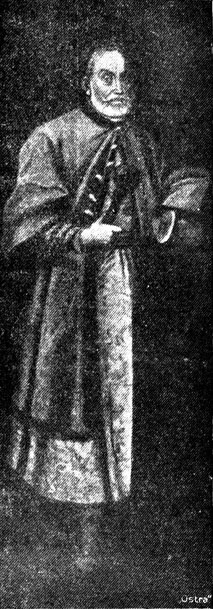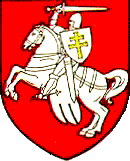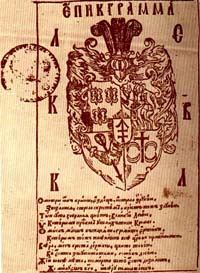![]()

Leu Sapega was a son of Ivan Ivanavich Sapega (died 1580), the "Starosta" (major) of Daragichyn and "Vayavoda" (general, head of the region) in Padlyassie (which is currently the region of Poland but it is still populated by belarusians). His mother was countess Bagdasa Druckaya Sakalinskaya (died 1584). Leu Sapega was born in 1557 in the estate of Astravok. He had two brothers: Grygor (served as "Padkamory" (secretary) in Orsha, died in1600) and Anrej ("Starosta" in Orsha , then "Kashtalyan" (treasurer) in Vitsebsk and "vayavoda" in Mscislau; died in 1611). He had also 3 sisters.
Leu Sapega was first educated at home. Then he had graduated fro Leipzig University majoring in philosophy, law and statehood. He had returned from abroad during the kingdom of the glorious Stefan Batory. Sapega was participating in request of his father and was forced to present it to king Batory. Since Batory was not fluent neither in Polish nor in Old Belarusian Sapega talked to Batory in Latin. This made Batory to notice a young man and Sapega received a position of secretary of the GDL when he was only 23.
At this time the Muscovy tsar Ivan the Terrible has started a war against the GDL. Young Sapega has formed at his own cost a hussar regiment and distinguished himself in the battles at Velikie Luki and during the Pskov siege. In 1548 Leu Sapega is sent as an ambassador to Moscow. Earlier his uncles Mikalaj Sapega (Vayavoda of Vitsebsk) and Andrej (vayavoda of Mensk). Leu Sapega haven't reached tsar Ivan the Terrible. The latter has died. Sapega has signed a 10 year peace treaty. By this treaty Muscovy kept Smalensk, but left Polacak, Vyalizh and Infland. 16 years later Sapega is sent again to Moscow by king Zhygimont. This times he signs a 20 year peace treaty with Boris Godunov.
After signing his first treaty Sapega has received the vast lands of Slonim (1586) and became a Vice-Chanceller of the GDL. Leu Sapega has used his influence to help an election of Zhygimont-August (Swedish prince) as the king of Rzhech Pospolita (kings were elected there by Sojm - meeting of aristocracy). After that king Zhygimont orders to Leu Sapega to compile all acting laws in the state into one Statut that would be obligatory around all state. This work of Vice-Chanceller Sapega was approved two years later by the Sojm in Warsaw under the title "Statut Vyalikaga Knyazstva Litovskogo" - "Statut of the Grand Duche of Lithuania". Sapega has printed the Statut at his own cost in the same1588.
In the introduction to a printed edition of Statut, and in the speech of Sapega to Warsaw Sojm about Statut, that was also placed in printed edition of Statut, Leu Sapega is expressing many progressive and humanitarian thoughts that would be more appropriate to XVIII - XIX centuries. His understanding of law, state power, freedoms and political freedoms are exceptional and could be a lesson to many of today's political leaders in Belarus. Thus in his dedication of the Statut to the king Sapega states that the most law abiding should be a king himself, since it is a king who has the biggest power. And abusing this power can lead to tyranny and injustice. For his outstanding work Leu Sapega was appointed by king on a highest position in Grand Duche of Lithuania - The Chanceller of the G.D.L. The king who was of catholic beliefs displaced from the Chanceller Kryshtof Radzivil who was famous for his support of protestants. Leu Sapega was born as an Eastern Orthodox. But later he has became protestant just like most of Belarusian aristocracy. In 1588 Leu Sapega becomes a roman catholic under the influence of famous Jesuit Petr Scarga. Nevertheless Leu Sapega was very tolerant in the questions of religion. He was supporting financially Eastern Orthodox, Roman Catholic and Greek Catholic (Unia) monasteries. Leu Sapega was a founder of many of the churches on the territory of G.D.L.
In 1621, at the very heat of struggles between Eastern Orthodox Christians headed by Vitsebsk Orthodox priest Meleci Smatrycki and Greek Catholic (Unia) christians headed by archbishop Iozafat Kuncevich, Leu Sapega writes his famous letter to Iozafat Kuncevich. In it Sapega supporting Unia as the the independent Belarusian religion warns Kuncevich against forcing people into it. He reminds that the unity of Christians in their beliefs should be made by christian love, not by arms, not by destroying Orthodox churches.
In 1620-es the Swedish king Gustav-Adol'f starts the war with Rzhech
Pospolita. Chanceller Sapega, despite his 63 year age again goes to war and successfully
defends his homeland. He becomes Getman of the G.D.L. (Chief military commander). Leu
Sapega ended his life as a Vayavoda of Vil'na - the capital of the G.D.L. At this time he
was working on bringing to order the documents of the Metrika
of the Grand Ducche of Lithuania. In 1633 a new king of Rzhech Pospolita Ladyslau IV
came to Vil'na Leu Sapega as a Marshal of the Great Duche of Lithuania was meeting him in
front of the senators of GDL with a marshal's mace on a horse. He was 80 years old. He
died two weeks later. ![]()

Leu Sapega was a great son of Belarusian people. He was a man of unique virtue - a scientist, a philosopher, a writer, a politician, a statesman and a military commander and a warrior. Belarus has never known such a great leader ever after.
![]()

The ancient family of Sapegi ( by some documents Sopigi) is long known in the history
of Creevichi. This family was related to Gedyminovichi and played distinctive role in the
history of Creevichi' lands before XV. Apparently the aristocratic title and noble
privileges were given to Sapegi for their bravery in defending their land from Tartars.
Below we depict the family crest of Sapegi with a poem (panegirik) written in 1617 by
Belarusian poet Lyavon Mamonich. According to the documents of the Metrika of the Grand Duche of Lithuania the family of
Sapegi originates from and owned lands in Smalensk region - the east part of
Cryvichi
realm. After losing Smalensk during Moscow wars to Muscovy the family was presented lands
in the western cryvichi lands. Sapegi , just like Radzivills, were the outstanding
figures in the history of ancient Belarus. The ancestors of Leu Sapega were in Eastern
Orthodox belief judging by their names: Semen, Ivan (Ivashko), Vasilij (Vas'ko), Bogdan,
Gleb, Yury, Feodor and others. They are referred to as "Sapezhychi" in some
official documents.
References used in this file:
"Gistoryya belaruskaj (kryuskaj) knigi. Sproba payasnitel'naj knigopisi ad kanca X
da pachatku XIX stagoddzya" [The History of Belarusian (Creeve) Book. An Attempt of
Explanational Description From the End of X to the Beginning of XIX Century], Ed. V.
Lastouski, Published by the Belarusian Center in Lithuania, Publishing House of Sakalouski
and Lan, Kauno 1926.
UC Berkeley Library call number : PG 2834.2 A12H51926 Main
[ Old poetry of Belarus. XVI - first half of XVII c.] Minsk, "Navuka i
Tehnika", 1992.
UC Berkeley Library call number : PG 2834.35 S38 1992 Main
 This file is a part of
the Virtual Guide to Belarus - a collaborative project
of Belarusian scientists and professionals
abroad. VG brings you the most extensive compilation of the information about Belarus on
the Web.
This file is a part of
the Virtual Guide to Belarus - a collaborative project
of Belarusian scientists and professionals
abroad. VG brings you the most extensive compilation of the information about Belarus on
the Web.
Please send your comments to the authors of VG to
Belarus
History | Statehood | Culture | Law and
Politics | Cities | Nature and Geography |
©1994-04 VG to Belarus
Disclaimer